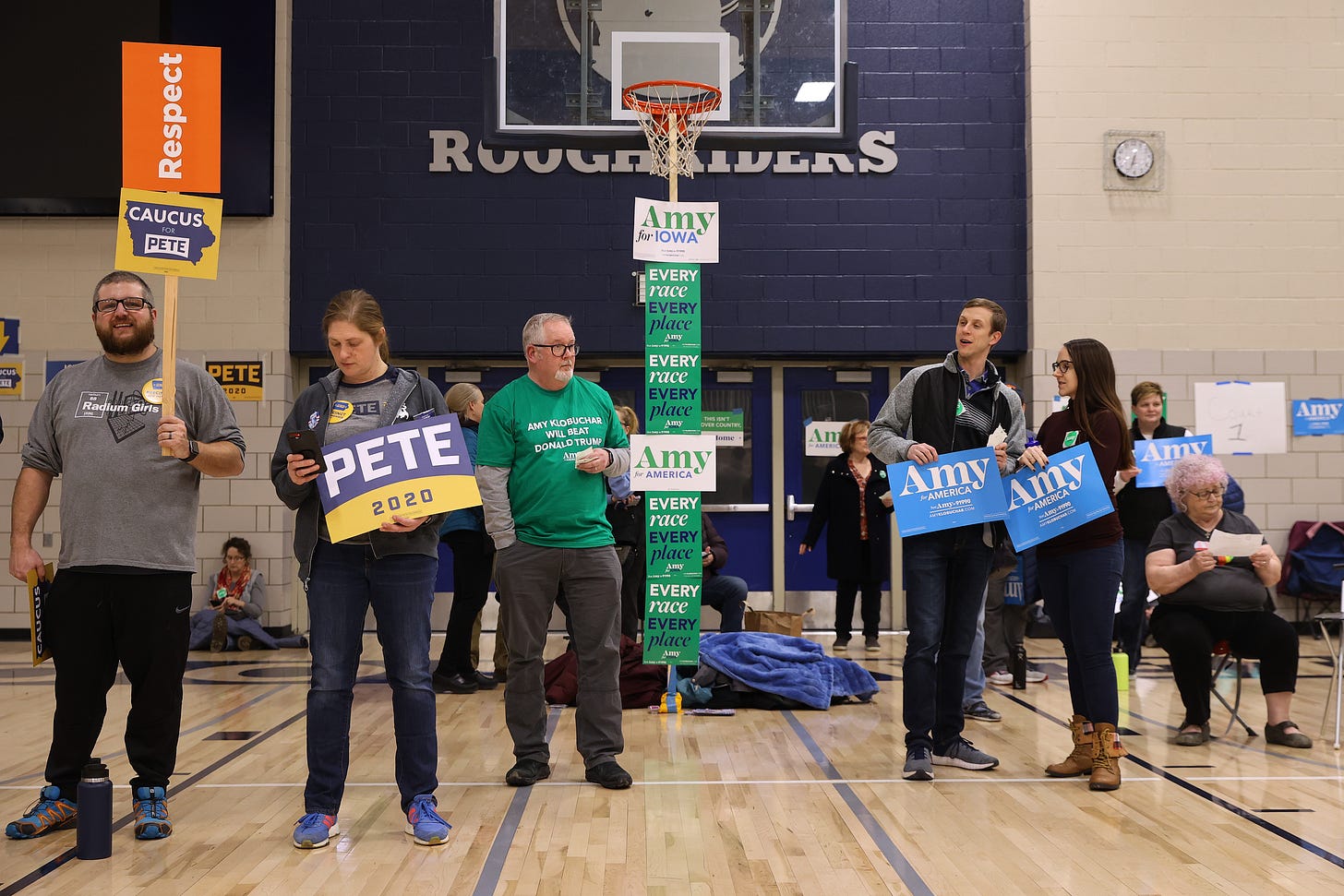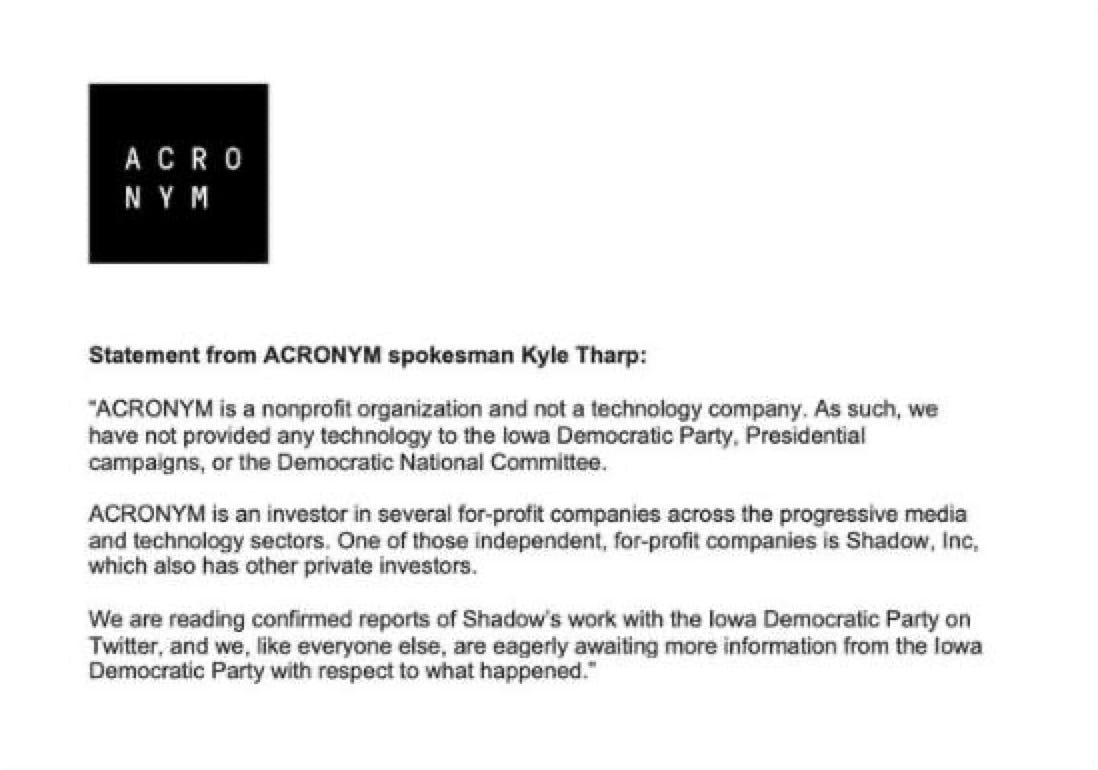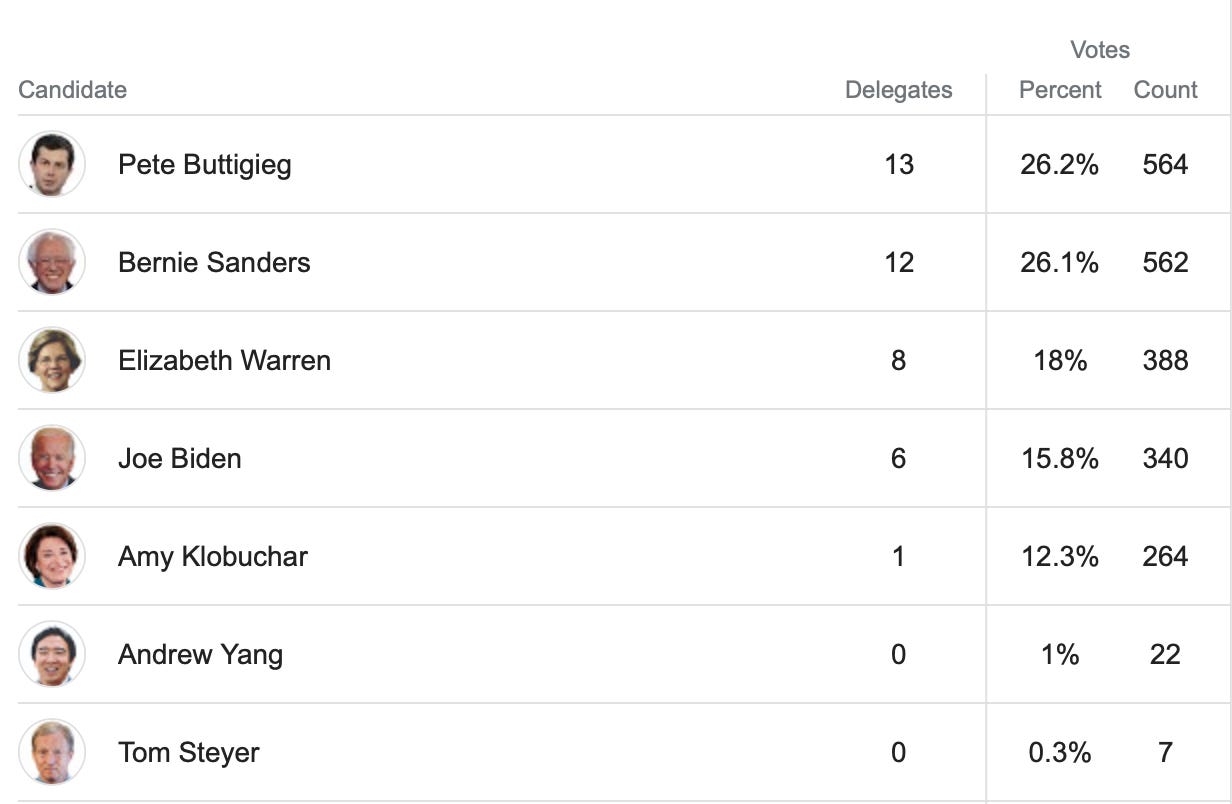What Went Wrong In Iowa

(Supporters of Democratic presidential candidates prepare to caucus in the gymnasium at Roosevelt High School February 03, 2020 in Des Moines, Iowa. (Photo by Chip Somodevilla/Getty Images.)
As many watched the Iowa Caucuses last night, excited for the first results in what will begin a very long Democratic vetting process, there was a pronounced glitch somewhere and we are still unable to discern who won. Several Iowa precincts in Iowa reported that workers were having trouble using a new app to relay caucus results and according to Bloomberg News, people were unable to log onto the app or to even download it to begin with. As we continue to wait for final results on the first big Democratic race, the questions become glaring: What is this new system and why use it now? Was a new app used, why did it fail and who is responsible? How much were app designers paid for something that didn’t work and why?
The Iowa Democratic Party issued a statement late Monday night that the delay in results from the state's caucuses was not because of a new state-wide app being utilized or the system being hacked, but rather due to "inconsistencies in the reporting" of the three sets of results being used. Iowa Democratic Party Communications Director Mandy McClure issued the following statement in response to the results glitch:
"We found inconsistencies in the reporting of three sets of results. In addition to the tech systems being used to tabulate results, we are also using photos of results and a paper trail to validate that all results match and ensure that we have confidence and accuracy in the numbers we report. This is simply a reporting issue, the app did not go down and this is not a hack or an intrusion. The underlying data and paper trail is sound and will simply take time to further report the results."
So while the Iowa Democratic Party is confirming here that an app was used for the election, they are not specifying or naming the makers of the app. Iowa Starting Line, one of the largest independent news outlets for the state, reported that many caucus chairs had difficulty just logging onto the app, with one caucus chair acknowledging that they had been unable to set the app up for two days and still couldn’t get it to work.
Precinct chairs confirmed that while they could log on and actually transmit data, the program was very slow. Another factor in delays was the slow functioning of the backup phone line that kept people on hold for a long time. In the midst of all of the reporting chaos, the Iowa Democratic Party was also performing “quality control checks.” The good news: Iowa did implement a paper trail for the new system so everything can be ultimately verified.
Who Created the App
While the Iowa Democratic Party would not confirm who had created the app they were now using for the first time, the HuffPost confirmed through “multiple Democratic sources” that the app had been designed by Shadow, a Democratic tech firm affiliated with, and funded by, ACRONYM, a Democratic digital nonprofit group. According to The Wall Street Journal the Iowa Democratic Party would not confirm who had developed the app due to the concern over possible hacking issues, but there had been reports from those trying to work with the app that there were concerns over its functionality.
HuffPost reported that the Iowa Democratic Party had paid Shadow over $60,000 for “website development” in late 2019 according to campaign finance records. Additionally, the payments were intended for an app that was going to be used to upload result numbers from the precincts. HuffPost went on to verify that a source from a Presidential campaign had confirmed to them that Shadow was in fact the creator of the app. Lee Fang, a reporter with The Intercept, also reported, citing three sources, that Shadow was the maker of the app.
What is even more concerning is that the HuffPost article specifies that the Nevada Democratic Party has also paid Shadow for “website development,” which could mean the same app is intended to be used for the upcoming Nevada Caucuses.
Who is Involved With Shadow
By late Monday evening ACRONYM, a Democratic digital nonprofit group that has rapidly expanded in recent years, had made a statement confirming they paid Shadow $60,000 but that they had no first hand knowledge of Shadow’s involvement in the Iowa Caucuses. (See statement below.)

Additionally, Tara McGowan, C.E.O. of ACRONYM issued the following tweet to confirm that they had no "information beyond the public statements” as to what had happened and who was involved specifically.
Who is Shadow
When you review the home page for Shadow, Inc. you can see that the company claims to be “campaign and technology veterans who have built and implemented technology at Hillary for America, Obama for America, Google, Kiva, Apple, the AFL-CIO, and the D.N.C.” In explaining the genesis of the company name, the website says:
“When a light is shining, Shadows are a constant companion. We see ourselves as building a long-term, side-by-side ‘Shadow’ of tech infrastructure to the Democratic Party and the progressive community at large.”
According to Anna Massoglia, a researcher at Open Secrets, Pete Buttigieg and Joe Biden’s campaigns were investors at Shadow and FEC filings reveal the nature of these payments. Pete for America made payments in July for “software rights and subscriptions” and Biden for President made payments for “text messaging.”
App Was Never Tested
The New York Times is reporting that cybersecurity experts worried about the app from the beginning, well before Monday — that it had not been vetted, tested at scale, or even shown to independent experts before being introduced in Iowa. Christopher C. Krebs, the director of the cybersecurity aspect of Homeland Security confirmed late Monday that the mobile app had not been vetted or evaluated by the agency. Former Iowa Democratic Party chairman Derek Eadon has called the entire event “a systemwide disaster.”
While it’s clear that the Iowa results won’t be released until sometime later in the day on Tuesday, some campaigns have started releasing internal numbers as some kind of proof of a win. Elizabeth Warren’s campaign manager Roger Lau told reporters that the Iowa caucus results were a “mess” and every second that passes “undermines the process a little bit. Roger Lau also told media that the campaign hadn’t seen much data, but according to the Warren internal figures there is a three-way tie with Warren, Sanders, and Buttigieg with Biden apparently a “distant fourth.”
Despite the need for more patience in order to assess the issue and determine the correct result, each candidate began to give their version of a victory speech, beginning with Senator Amy Klobuchar. The “Bold Without Cause Award” of the night definitely goes to former South Bend Mayor, Pete Buttigieg who declared victory by calling the night “an improbable hope [that] became an undeniable reality” while a campaign spokesman posted screen shots of precincts they believe Buttigieg won.
While it’s clear that the new protocols put into place by Iowa were likely not tested as thoroughly as they needed to be and failed on the whole, the reports that the same app design has been funded by Nevada and may be used again are cause for alarm. As we enter this season of Democratic races, heightened by the previous electoral failures of 2016 that have yet to be properly investigated and corrected, it can’t be stated enough that we need slow, methodical, painstaking accuracy. I applaud Iowa for backing up this experiment with a paper trail, but as for the rest of it — we must do better.
Update: The Nevada Democrats issued the following statement below from Democratic Party Chair William McCurdy, who assures people that the issues in Iowa will not be a problem for Nevada during their caucus primary.
Final Update
Results from the first Democratic Primary Election were significantly delayed but finally filtered in with a final result by Wednesday. Ultimately, Pete Buttigieg and Bernie Sanders were separated in the lead by only .1% of a point at 26.2% and 26.1% respectively. Elizabeth Warren finished third with 18%, Joe Biden in fourth with 15.8% and Amy Klobuchar in fifth with 12.3%. But the finalized results were full of inconsistencies and given the technical issues, delay in reporting results, chaos in organization and lower voter turnout than expected, the Democratic Party has really struggled this week to instill confidence in the process for 2020.

(Source: Associated Press.)
Among some of the more major snafus, were precincts having issues with results that were internally inconsistent and that were missing data or that were not possible under the complex rules of the Iowa caucuses. Some discrepancies were vote tallies that did not add up, while other precincts had the wrong number of delegates to certain candidates allotted. In some cases, the Iowa Democratic Party’s reported results did not match those reported by the precincts.
It’s important to stress that a lot of these errors were fairly harmless and did not definitively reflect an overall plan to rig the vote or ruin the election. These inconsistencies reflect a sense of disorganization and make Democratic Party operatives look amateur. The delay in results and the near tie for first place has also hindered the momentum a definitive winner would have had in terms of fundraising, especially heading into the New Hampshire Primary on Tuesday.
The Iowa Caucus is a tricky process — participants express their preference for a candidate when they first arrive at the Caucus and these votes are then recorded in what is called a “first alignment.” Then, those candidates with limited support at a precinct (usually less than 15%) are deemed “not viable” and their supporters are able to join another viable candidate’s pool. This process is called “realignment.” The preferences once participants “realign” are also recorded, and this is called the “final alignment.”
One of the major issues on Monday was the occurrence of viable candidates losing support after realignment, and a vote share in the final alignment that was lower than before. This should not have been possible given the caucus rules. This latest voting disaster in Iowa is just another argument for why the caucus process should be abandoned in favor of a standard primary vote. It’s also worth noting that the process was recorded on paper, which made the defects visible and led to catching all of the errors in the caucus process.
If you like this piece and you want to support independent journalism from a female perspective, you can forward this article to others or get a subscription to Shero today. Paid subscriptions allow me to keep publishing critical and informative work that is often made available to the public, so subscribe now.
Amee Vanderpool writes the “Shero” Newsletter and is an attorney, contributor to Playboy Magazine and analyst for BBC radio. She can be reached at avanderpool@gmail.com or follow her on Twitter @girlsreallyrule.






FYI. I think there's a mistake in this clause: "While the Iowa Democratic Party would confirm who had created the app they were now using for the first time," - I think you mean "would not confirm."
A company called "Shadow"?? Dark money? Mayor Pete and Biden investors? OK. A major PR fail all around, sort of like the roll out for the ACA a few years ago. Caucuses are confusing and (to me) ridiculous... as is (to me) white bread Iowa being the first primary, making it so consequential, despite being rather unrepresentative. As has pretty much been the case with New Hampshire for decades. OT, I had to laugh watching an MSNBC field guy doing a stand up at the Buttigieg hq. In the background, a manager was "casting" the bleachers behind the podium - putting every brown and female person they could find back there. HA.